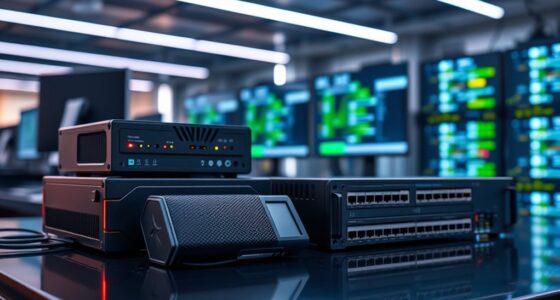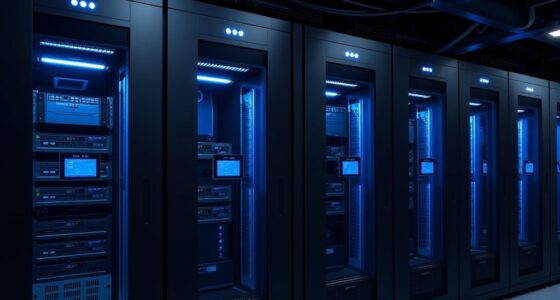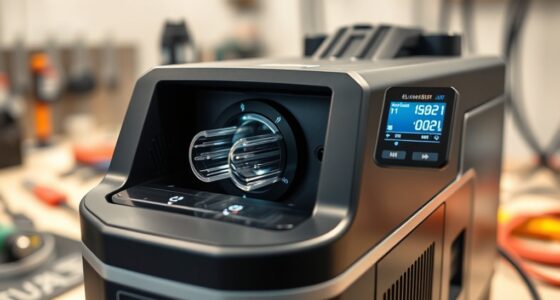In 2025, I find that both Synology and QNAP offer top-tier NAS devices, but the best choice depends on your needs. Synology’s user-friendly DSM interface excels for beginners, while QNAP’s hardware customization suits power users. The latest models like the DS723+ and TS-464-8G deliver robust performance, but subtle differences in expandability and features matter. Stay with me to explore how these devices compare across key factors and which might be right for you.
Key Takeaways
- Synology offers user-friendly DSM software ideal for beginners, while QNAP provides more advanced customization with QTS for power users.
- Hardware options vary: Synology focuses on compact, efficient models; QNAP offers larger, enterprise-grade devices with extensive expandability.
- Storage capacity and performance differ: QNAP supports higher speeds, multiple drives, and hardware acceleration, whereas Synology emphasizes stability and ease of use.
- Compatibility with third-party drives and accessories varies, impacting future upgrades and customization options for both brands.
- The best choice in 2025 depends on user needs: simple setup and stability versus advanced features and scalability.
Synology 2-Bay NAS DS223 (Diskless)
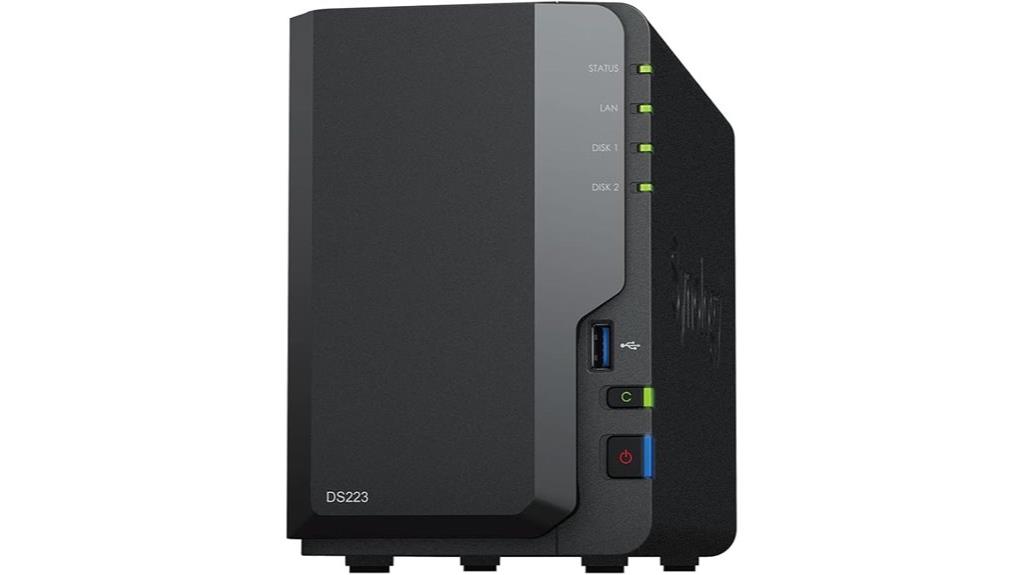
If you’re looking for an affordable, easy-to-use NAS device for home or small office use, the Synology 2-Bay NAS DS223 is an excellent choice. Its compact design measures just 9.15 x 4.25 x 6.5 inches and weighs only 2.82 pounds, making it perfect for tight spaces. The diskless setup allows you to install your preferred drives, giving you flexibility and control. It offers centralized data management, secure sharing, and seamless multi-platform access. With built-in data protection tools and intelligent surveillance features, the DS223 guarantees your data remains safe and accessible. Plus, it comes with a 2-year warranty and excellent reviews.
Best For: home users and small offices seeking an affordable, easy-to-use NAS device with flexible storage options and reliable data management.
Pros:
- Compact, lightweight design ideal for tight spaces and easy placement
- Diskless setup provides customization and control over storage configuration
- Secure data sharing and management with built-in protection tools and surveillance features
Cons:
- Limited to two drive bays, which may restrict storage capacity for growing needs
- No pre-installed drives, requiring users to purchase and install compatible disks separately
- Entry-level features may lack advanced enterprise-grade functionalities
Synology DS723+ 2-Bay NAS Bundle with 6TB Storage
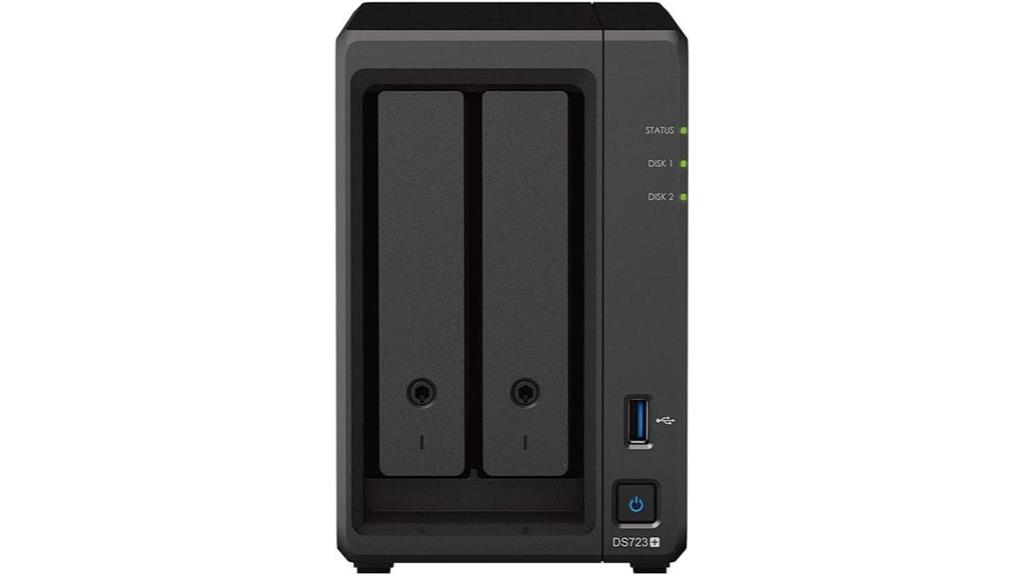
The Synology DS723+ 2-Bay NAS Bundle with 6TB storage stands out as an excellent choice for small businesses and advanced home users who need reliable, versatile data management. It features an AMD Ryzen R1600 dual-core processor, 2GB DDR4 ECC RAM, and expandable memory, making it suitable for multimedia, backups, and virtualization. With two 3TB WD Red Plus drives and 1GbE LAN ports, it offers solid performance. Despite some setup complexity and software quirks, the device’s user-friendly interface and robust features generally satisfy users. It’s a dependable, compact option for those seeking efficient storage with room to grow.
Best For: small businesses and advanced home users seeking reliable, versatile storage with multimedia, backup, and virtualization capabilities.
Pros:
- User-friendly interface with robust features suitable for multimedia and data management
- Expandable RAM and solid performance with AMD Ryzen R1600 processor
- Compact design with reliable 6TB storage solution using WD Red Plus drives
Cons:
- Complex setup process that may require extensive technical support
- Software updates have caused issues like removal of key features and compatibility problems
- Drive compatibility can be restrictive, with firmware updates potentially losing support for previously compatible drives
Synology WRX560 Wi-Fi 6 Router
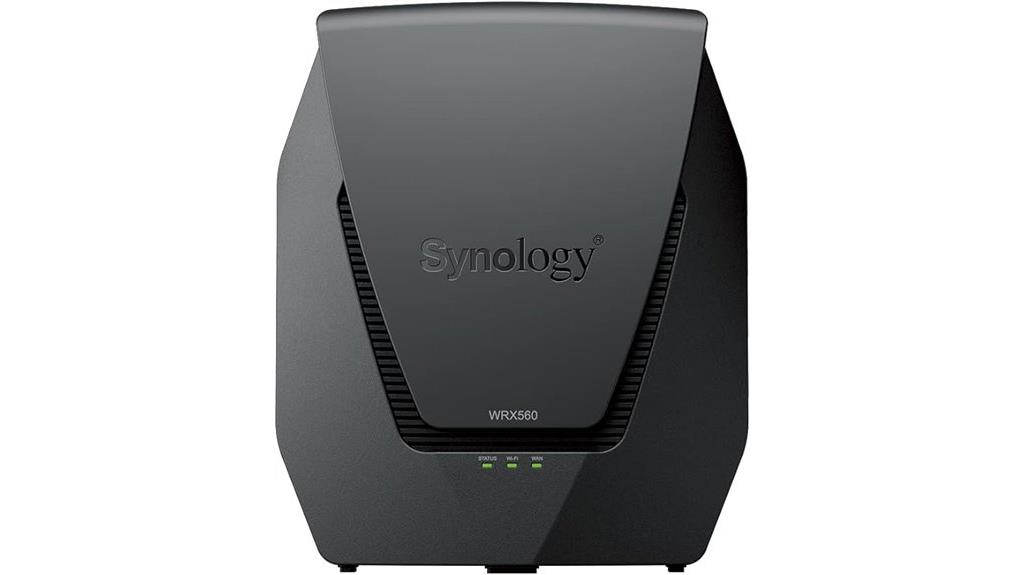
The Synology WRX560 Wi-Fi 6 Router stands out as an excellent choice for busy households and home offices that demand fast, reliable internet with robust security features. It supports dual-band Wi-Fi 6, delivering speeds up to 3 Gbps and connecting up to 150 devices, ideal for streaming, gaming, and smart home devices. Its mesh network capability ensures seamless coverage throughout your home, while Synology’s SRM interface makes setup and management straightforward. Security is a priority, with WPA3, Threat Prevention, VLAN segmentation, and web filtering. Although some users report occasional reliability issues, the WRX560 offers a solid, feature-rich solution for enhancing your network’s performance and security.
Best For: households and home offices requiring fast, reliable Wi-Fi 6 connectivity with robust security features and seamless mesh coverage.
Pros:
- Supports dual-band Wi-Fi 6 with speeds up to 3 Gbps and connection for up to 150 devices
- Easy-to-use SRM interface simplifies setup, management, and firmware updates
- Advanced security features including WPA3, Threat Prevention, VLAN segmentation, and web filtering
Cons:
- Occasional reliability issues such as inconsistent connectivity and streaming interruptions reported by some users
- Hardware design can be unstable, with a top-heavy build prone to tipping when cables are plugged in
- Limitations like a cap of 100 blocking entries and frequent reconfiguration of IP reservations can be inconvenient
Synology 2-Bay DiskStation DS223j (Diskless)

Ideal for users seeking a secure, private cloud solution, the Synology 2-Bay DiskStation DS223j (Diskless) offers straightforward setup and reliable data management. Its diskless design gives you flexibility to choose your drives, ensuring tailored storage capacity. It provides seamless file sharing and remote access across multiple platforms, keeping you connected from anywhere. With all-encompassing backup options, it safeguards your media libraries and documents, protecting your valuable data. Backed by a 2-year warranty and detailed support resources, this compact NAS combines security, accessibility, and ease of use. It’s an excellent choice for personal or small business private cloud storage.
Best For: individuals and small businesses seeking a secure, customizable private cloud storage solution with easy access and reliable data protection.
Pros:
- Offers flexible storage capacity with a diskless design allowing users to choose their drives.
- Provides seamless multi-platform file sharing and remote access for enhanced productivity.
- Includes a 2-year warranty with comprehensive support resources for setup and troubleshooting.
Cons:
- Requires users to purchase and install their own drives, which may add to initial setup time and cost.
- May have a learning curve for users unfamiliar with NAS configuration and management.
- Lacks pre-installed drives, so initial setup depends on compatible storage media chosen by the user.
Synology IP Camera License Pack for 1 (CLP1)

If you’re setting up a small-scale surveillance system on your Synology NAS, the Synology IP Camera License Pack for 1 (CLP1) offers a straightforward way to add a single camera without complicated licensing hassles. It activates one camera, making it ideal for basic security needs. The license is a one-time purchase, providing lifetime support and seamless integration with Surveillance Station. Purchased licenses are transferable, so you can move them between compatible systems if needed. While shipping costs can be a concern, the simplicity and reliability of this license make it a cost-effective solution for individual camera setups.
Best For: individuals or small businesses seeking a simple, reliable, and cost-effective solution to add a single IP camera to their Synology NAS surveillance system.
Pros:
- Easy to activate with a one-time purchase and seamless integration into Surveillance Station
- Transferable license allows flexibility across compatible Synology systems
- Provides lifetime support without recurring subscription fees
Cons:
- Shipping costs and logistics may add to the overall expense
- Limited to a single camera, which may not suit larger surveillance setups
- Physical license key delivery can cause delays compared to digital licensing options
Synology Surveillance Station Display Device VS600HD Black
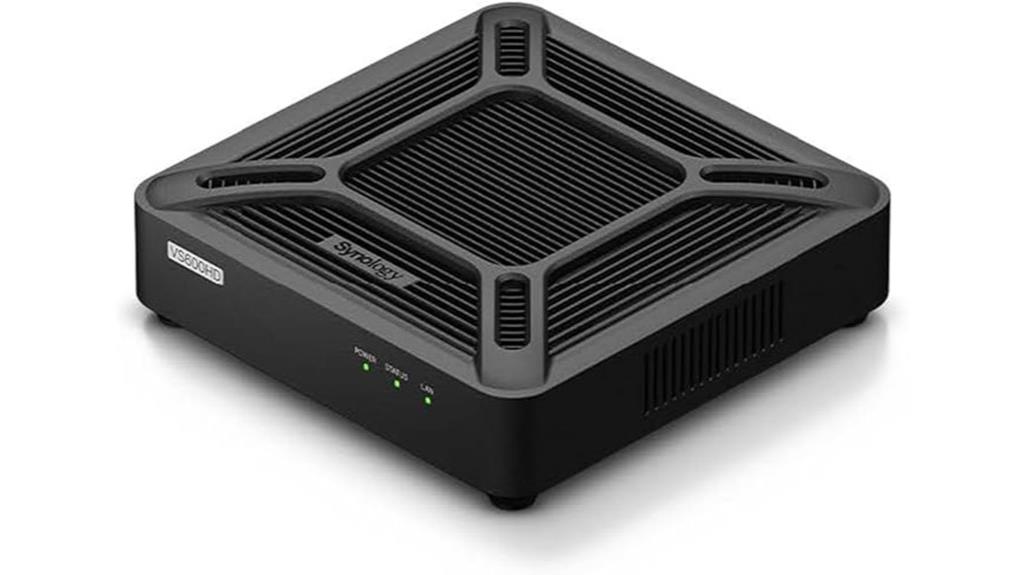
For users seeking a powerful video wall solution, the Synology Surveillance Station Display Device VS600HD Black stands out by supporting up to 50 video streams, making it perfect for large-scale surveillance setups. It delivers crystal-clear 4K resolution clips and supports IP camera streams up to 720p/600 FPS, ensuring high-quality monitoring. Its plug-and-play setup allows for instant access to Surveillance Station, simplifying deployment. Additionally, it meets US government procurement standards and is NDAA and TAA compliant, ensuring security and reliability. Overall, the VS600HD Black offers a robust, scalable, and easy-to-use display option for advanced surveillance environments.
Best For: large-scale surveillance operations requiring high-resolution video wall scaling and easy deployment.
Pros:
- Supports up to 50 video streams, ideal for extensive surveillance setups
- Delivers crystal-clear 4K resolution clips with support for IP cameras up to 720p/600 FPS
- Plug-and-play setup ensures quick and straightforward installation
Cons:
- May require compatible infrastructure to handle multiple high-resolution streams
- Limited to Surveillance Station ecosystem, potentially restricting integration with other systems
- No mention of advanced features like AI analytics or remote management in the overview
Synology 4-Bay DiskStation DS925+ (Diskless)
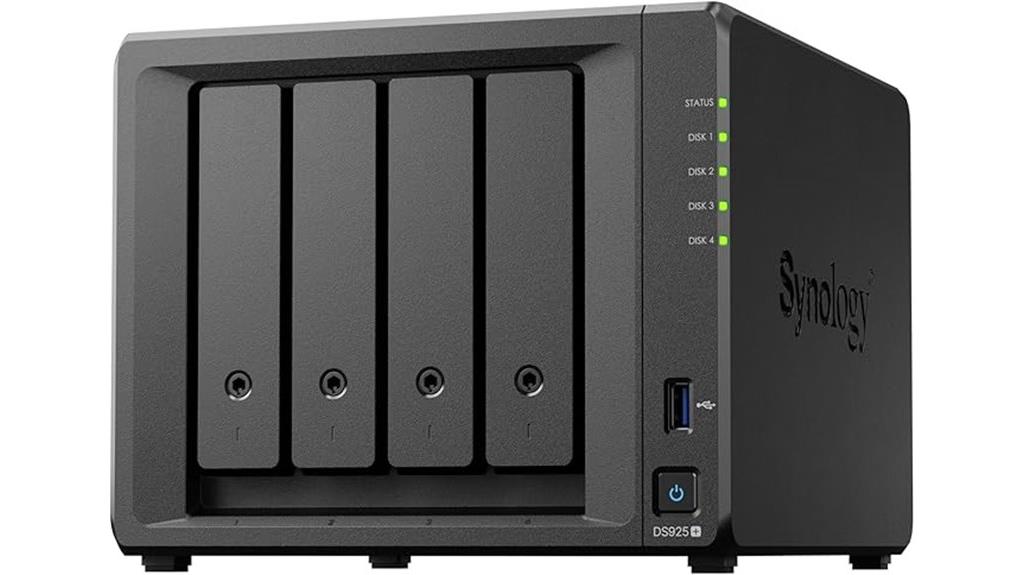
The Synology DiskStation DS925+ (diskless) stands out as a solid choice for small businesses and power users who need reliable, scalable storage with advanced data management features. It supports up to nine drives with expansion units, offers dual 2.5GbE ports for fast, redundant networking, and includes two M.2 NVMe slots for caching. Powered by DSM, it excels at data sharing, backup, virtualization, and surveillance. Although it’s compact and sturdy, it only supports drives listed on Synology’s compatibility list, which can limit flexibility. Despite some frustration over drive restrictions and higher costs, the DS925+ remains a dependable, feature-rich option for demanding users.
Best For: small businesses and power users seeking a reliable, scalable NAS with advanced data management features and high network throughput.
Pros:
- Supports up to nine drives with expansion units for scalable storage
- Dual 2.5GbE ports for fast, redundant network connectivity
- Includes M.2 NVMe slots for caching to enhance performance
Cons:
- Only supports drives listed on Synology’s official compatibility list, limiting flexibility
- Higher costs due to reliance on Synology-branded drives and accessories
- Customer feedback indicates frustration over drive restrictions and support policies
Synology 4-Bay DiskStation DS425+ (Diskless)
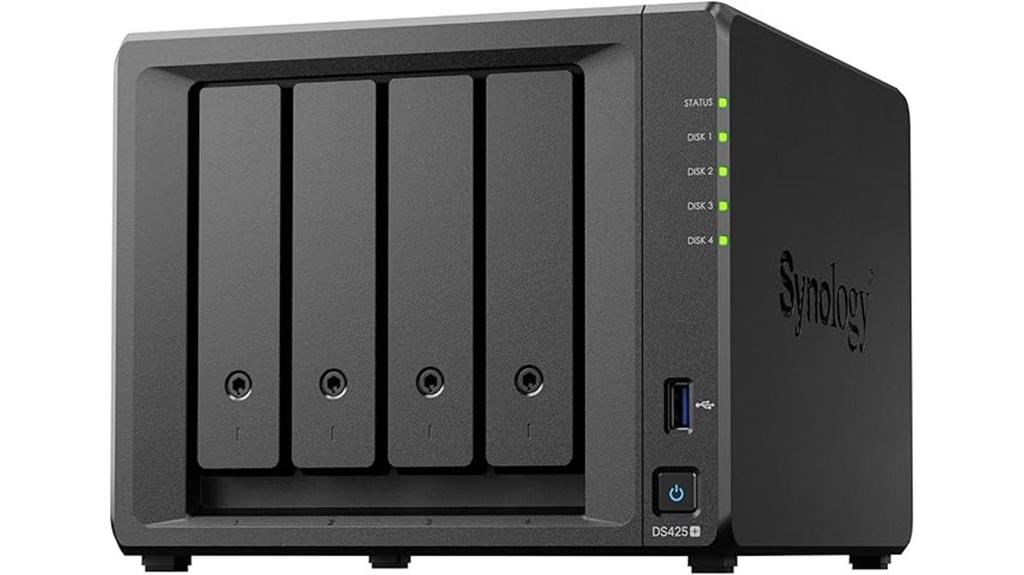
The Synology DiskStation DS425+ stands out as a top choice for small businesses and advanced home users who prioritize robust software features and ease of use over raw hardware flexibility. It’s a 4-bay, diskless NAS supporting up to 80TB of data with speeds around 278-281 MB/s, powered by an Intel J4125 quad-core processor. The device runs DSM, offering intuitive management, backup tools, media transcoding, and surveillance options. However, drive compatibility is limited to Synology-branded drives, which can be costly and restrictive. Despite these limitations, its stable software ecosystem makes it ideal for users seeking reliable, user-friendly storage without extensive hardware tinkering.
Best For: small businesses and advanced home users who value reliable software features and ease of use over extensive hardware customization.
Pros:
- User-friendly DSM operating system with intuitive management tools
- Strong media transcoding and backup capabilities suitable for diverse applications
- Stable ecosystem with seamless file sharing and multi-platform access
Cons:
- Limited drive compatibility restricted to Synology-branded drives, increasing costs
- Higher overall cost due to premium-priced drives and components
- Restricted support for third-party drives and surveillance hardware, limiting flexibility
Synology RackStation RS422+ NAS Server with Ryzen CPU
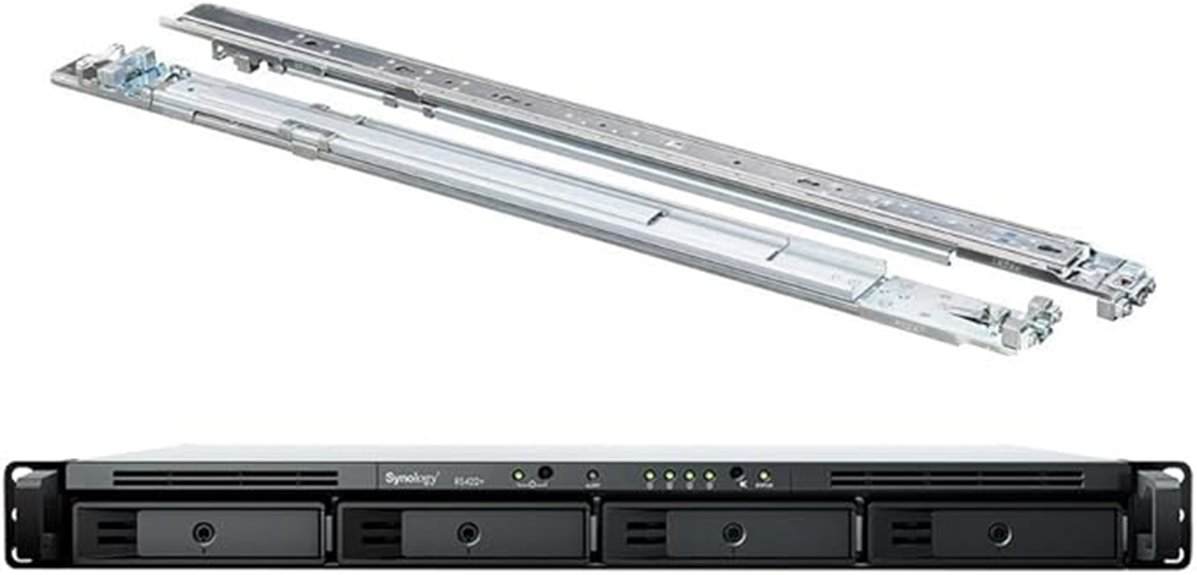
If you’re managing a small business or setting up a home lab, the Synology RackStation RS422+ with Ryzen CPU offers a compact yet powerful solution. Its 1U rack-mount design fits easily into tight spaces while delivering robust performance with a Ryzen R1600 2-core processor that boosts up to 3.1GHz. Equipped with 2GB DDR4 ECC RAM and 8TB of storage, it handles high-speed data access and extensive backups efficiently. With dual Gigabit Ethernet ports supporting Link Aggregation, plus USB and PCIe expansion, it’s flexible for scaling. Running DSM, it provides strong data protection, file sharing, and collaboration tools suitable for small-scale enterprise or home lab environments.
Best For: small businesses and home labs seeking a compact, high-performance NAS with flexible storage and robust data protection features.
Pros:
- Compact 1U rack-mount design suitable for tight spaces
- Powerful Ryzen R1600 CPU with Turbo boost up to 3.1GHz for efficient processing
- Supports high-speed SSD storage, Link Aggregation, and PCIe expansion for scalability
Cons:
- Comes with only 2GB DDR4 ECC RAM, which may require upgrading for demanding applications
- Hard drives and memory are sold separately, adding initial setup costs
- Limited internal storage capacity out of the box (8TB) may require expansion for larger data needs
QNAP TS-464-8G-US 4-Bay Desktop NAS with Intel Celeron Processor

Designed for small businesses and home users seeking reliable performance, the QNAP TS-464-8G-US offers a powerful Intel Celeron N5105/N5095 processor that handles multitasking with ease. It features 8GB DDR4 RAM to guarantee smooth operation and quick data access. The dual 2.5GbE ports boost network speeds, making file sharing faster across devices. With dual M.2 PCIe NVMe SSD slots, it supports cache acceleration for improved responsiveness. Multiple USB 3.2 Gen 2 ports enable quick transfer of large files. Perfect for centralized storage and backups, it provides secure remote access via MyQNAPCloud, making it a versatile choice for small-scale storage needs.
Best For: small businesses and home users seeking reliable, high-performance centralized storage and backup solutions.
Pros:
- Powerful quad-core Intel Celeron processor with up to 2.9 GHz burst speeds for efficient multitasking
- Dual 2.5GbE ports for faster network file sharing and transfer speeds
- Dual M.2 NVMe SSD slots for cache acceleration, enhancing system responsiveness
Cons:
- Limited to 8GB RAM, which may be insufficient for very heavy multitasking or large-scale enterprise use
- No built-in 10GbE ports, potentially limiting future high-speed network upgrades
- May require technical knowledge for optimal setup and configuration
QNAP TS-216G-US 2-Bay Desktop NAS with ARM Cortex-A55 CPU

For anyone seeking an affordable yet capable NAS for home or small office use, the QNAP TS-216G-US stands out thanks to its ARM Cortex-A55 quad-core processor and 2.5GbE ports. It offers fast file sharing, multimedia streaming, and AI features like face recognition. With 4GB DDR4 RAM and support for up to 24TB drives, it’s versatile for backups and media tasks. Although setup can be complex and some tasks strain its CPU, overall, it’s a reliable, cost-effective solution. Customers praise its ease of access and performance for everyday use, making it ideal for users prioritizing affordability and simplicity.
Best For: home users and small offices seeking an affordable, reliable NAS with multimedia and basic AI capabilities.
Pros:
- Affordable price point with solid performance for everyday tasks
- Easy access via MyQNAPCloud and user-friendly web interface
- Supports fast network speeds with 2.5GbE ports and up to 24TB storage capacity
Cons:
- Setup process can be complex and security features overly cautious
- Limited CPU resources may cause slowdowns during intensive AI or multimedia tasks
- Noise levels and potential hardware limitations could affect user experience
QNAP TS-433eU Compact 1U NAS with 2.5GbE and NPU Acceleration

The QNAP TS-433eU stands out as an ideal choice for small to medium-sized businesses seeking a compact, space-efficient NAS with robust network performance. Its 1U rackmount design, measuring just over 11 inches deep, fits well in tight spaces. Powered by a quad-core Cortex-A55 processor and 4GB DDR4 RAM, it delivers solid processing power. Dual 2.5GbE ports ensure fast, reliable network connectivity, supporting up to 2.5Gb speeds. The built-in NPU accelerates AI features like face recognition and multimedia management, enhancing security and efficiency. Plus, its support for cloud backups and ransomware protection makes it a versatile, dependable solution for modern data needs.
Best For: small to medium-sized businesses seeking a compact, high-performance NAS with advanced AI and network capabilities.
Pros:
- Compact 1U rackmount design ideal for space-constrained environments
- Dual 2.5GbE ports for fast and reliable network connectivity
- Built-in NPU accelerates AI features like face recognition and multimedia management
Cons:
- Diskless configuration requires users to purchase drives separately
- Limited onboard RAM (4GB) may impact performance with heavy multitasking or large workloads
- ARM-based processor might have compatibility limitations with some software applications
Factors to Consider When Choosing Synology Vs QNAP Comparison

When choosing between Synology and QNAP, I consider several key factors like hardware compatibility, software usability, and overall performance. Security features and ongoing support also play vital roles in my decision-making process. Understanding these points helps me find the best device to meet my specific needs.
Hardware Compatibility and Flexibility
Choosing between Synology and QNAP NAS devices requires careful consideration of hardware compatibility and flexibility, as these factors directly impact your ability to upgrade and customize the system. Compatibility with third-party drives varies; some models support only official or Synology-branded drives, limiting options for expansion. Drive support policies often restrict use to specific brands and models, affecting future upgrade potential. Hardware configurations like RAM, CPU, and network ports differ markedly, influencing performance and customization. Support for external accessories, expansion units, and PCIe cards also varies, impacting upgrade possibilities. Additionally, firmware and software updates can change drive compatibility lists, meaning you may need to recheck supported hardware periodically. These factors are vital for tailoring your NAS to evolving needs and ensuring long-term flexibility.
Software Ecosystem and Usability
Selecting between Synology and QNAP NAS devices involves evaluating their software ecosystems and usability, as these determine how easily you can manage, expand, and customize your system. Synology’s DiskStation Manager (DSM) offers an intuitive, user-friendly interface that simplifies file management, backups, and multimedia tasks, making it ideal for beginners. In contrast, QNAP’s QTS provides a more feature-rich environment with extensive customization options, though its interface can be complex for newcomers. Synology emphasizes simplicity and stability, with well-integrated apps for backup, surveillance, and multimedia. QNAP supports a broader range of third-party apps and advanced features for power users and IT professionals. Both platforms deliver regular firmware updates, but Synology’s updates tend to be more stable, reducing potential compatibility issues.
Performance and Speed
Performance and speed in NAS devices hinge on several key hardware factors that directly affect how quickly and smoothly data is processed and transferred. The processor type plays a big role; ARM-based CPUs tend to be less powerful than Intel or AMD processors, especially for intensive tasks. Network interface speeds, like 1GbE, 2.5GbE, or 10GbE, directly impact data transfer rates and responsiveness. RAM capacity and speed are vital for multitasking and cache efficiency, with higher, faster RAM delivering smoother performance during demanding workloads. Drive support also matters—SSD drives offer markedly faster read/write speeds compared to traditional HDDs, boosting overall performance. Additionally, hardware acceleration features like NPUs or GPUs can enhance multimedia processing and AI workflows, further improving speed for specialized tasks.
Security Features and Protections
When evaluating Synology and QNAP NAS devices, security features play a crucial role in safeguarding your data. Both brands offer strong protections like encryption, VPN support, and multi-factor authentication. Synology emphasizes security with tools like Threat Prevention, web filtering, and automatic updates through its DiskStation Manager OS, making management straightforward. QNAP, on the other hand, leverages NPU acceleration for AI-based security functions, along with ransomware protection via storage snapshots and malware scanning. While both support VLAN segmentation and firewalls, Synology’s user-friendly interface often makes managing security protocols easier for less technical users. QNAP may require more manual setup for advanced security, but it offers powerful, customizable options. Overall, both brands prioritize security, but Synology simplifies management for everyday users.
Support and Maintenance
Both Synology and QNAP prioritize support and maintenance to keep their NAS devices running smoothly, but their approaches differ. Synology is known for thorough, user-friendly customer service, offering regular firmware updates with clear guidance. Their support portals are easy to navigate, and they typically provide a standard 2-3 year warranty. QNAP, on the other hand, offers extensive online resources like community forums and detailed knowledge bases, but their support response can sometimes be slower or less consistent. Warranty policies vary depending on the product and region. Both brands provide multiple support channels, including phone, email, and live chat, but Synology emphasizes accessible support portals, while QNAP’s remote support features and proactive alerts can enhance long-term device health and security.
Cost and Expandability
Choosing between Synology and QNAP largely depends on your budget and future expansion plans. QNAP generally offers more flexible hardware options and higher expandability, with additional drive bays, PCIe slots, and NVMe SSD support. This makes it easier to scale your storage over time. In contrast, Synology’s expandability is more limited, often relying on proprietary expansion units that can increase costs and complexity. Synology also restricts drive compatibility to their official list, which can drive up expenses. QNAP models often include multiple M.2 slots and USB ports, allowing for straightforward cache and storage upgrades without extra enclosures. Overall, QNAP provides a broader range of upgrade paths, making it a better choice for users who plan to grow their storage over the years.
Frequently Asked Questions
How Do Synology and QNAP Compare in Expanding Storage Capacity Long-Term?
I find that Synology and QNAP both excel at expanding storage long-term, but QNAP often offers more flexible options with larger, scalable drives and expansion units. Synology is user-friendly with seamless expansion through their hybrid models. I recommend evaluating your storage needs now and in the future, then choosing the device that best supports easy expansion and integration with your current setup.
Which Brand Offers Better Integration With Third-Party Apps and Services?
If you think your NAS needs a social life, QNAP’s better at integrating with third-party apps and services. I’ve found their open ecosystem makes it easier to connect with everything from cloud backups to smart home devices. Synology’s more curated approach is nice, but QNAP’s flexibility really wins me over when I want my NAS to play well with others. So, if integration’s your game, QNAP’s your best bet.
What Are the Differences in Energy Efficiency Between Synology and QNAP Devices?
I find Synology devices tend to be more energy-efficient than QNAP models. They use less power during idle and active states, which helps reduce electricity bills and minimizes environmental impact. QNAPs often consume more energy, especially during intensive tasks or when running multiple applications. If you’re looking for a device that saves energy and runs quietly, Synology is usually the better choice for efficiency.
How Do Hardware Upgrade Options Vary Between Synology and QNAP NAS Models?
When it comes to hardware upgrades, I’ve noticed that QNAP models generally offer more flexibility, allowing me to easily swap out RAM, storage drives, and even network cards. Synology devices tend to have more limited upgrade options, often requiring me to choose a specific configuration upfront. If upgradeability is a priority, I’d lean toward QNAP, but if I want a more streamlined experience, Synology might suit me better.
Which Brand Provides Superior Customer Support and Warranty Services?
Honestly, I’d say Synology takes the cake for customer support and warranty services. They’re surprisingly responsive, often going the extra mile, unlike QNAP’s sometimes sluggish responses. It’s amusing how a brand that prides itself on user experience actually delivers better service, but hey, that’s my experience. If you’re looking for peace of mind, Synology’s support might just be your best bet for hassle-free help when you need it most.
Conclusion
Choosing between Synology and QNAP is like picking a trusted partner for a long journey; both have their strengths. I once thought I’d settle for a simple NAS, but after diving into their features, I realized it’s about finding the right fit for your needs. Whether you prioritize ease of use or raw power, remember that the right device can turn your data management into a smooth sail rather than rough waters.


